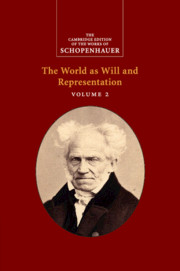Chapter 5 - On the Intellect in the Absence of Reason
Published online by Cambridge University Press: 30 June 2022
Summary
A perfect understanding of animal consciousness must be possible, since we can construct it by simply subtracting out certain qualities of our own consciousness. But animal consciousness involves instinct, which is more highly developed in animals than it is in human beings, and in some animals becomes a creative drive.
Animals possess understandingc but not reason, so they have intuitive but not abstract cognition: they apprehend things correctly and grasp immediate causal connections, indeed the higher animals do so throughseveral linksof the causal chain; still, they do not really think, because they lack concepts, i.e. abstract representations. This leads first of all to the lack of a real memory, which afflicts even themost intelligent animals and is the principal reason why their consciousness is so different from that of humans. Perfect clarity of mind rests on a distinct consciousness of the past and of the eventual future as such and in connectionwith the present.This requires a truememory which is thus an orderly, coherent, thoughtful recollection: but this is possible only bymeans of universal concepts, which are needed even with respect to things that are entirely individual, so that they can be recalled in order and succession. Our lives being filled with immense quantities of things and events that are similar or the same, we cannot recall each one of these immediately, intuitively and individually; not only do we have insufficient time for such a feat, but even the most comprehensivememorywouldbe incapable of such an act: so all this can be retained only if it is subsumed under universal concepts, and consequently reduced to a relatively small number of propositions by means of which we then have an orderly and adequate overview of our past at our ready disposal. There are only a few scenes from our past that we can recall vividly, and our awareness of the time that has elapsed since then and the events that have taken place during it ismerely abstract, mediated by concepts of things and numbers that now represent days and years and what has taken place in them.
- Type
- Chapter
- Information
- Schopenhauer: The World as Will and Representation , pp. 65 - 68Publisher: Cambridge University PressPrint publication year: 2018

